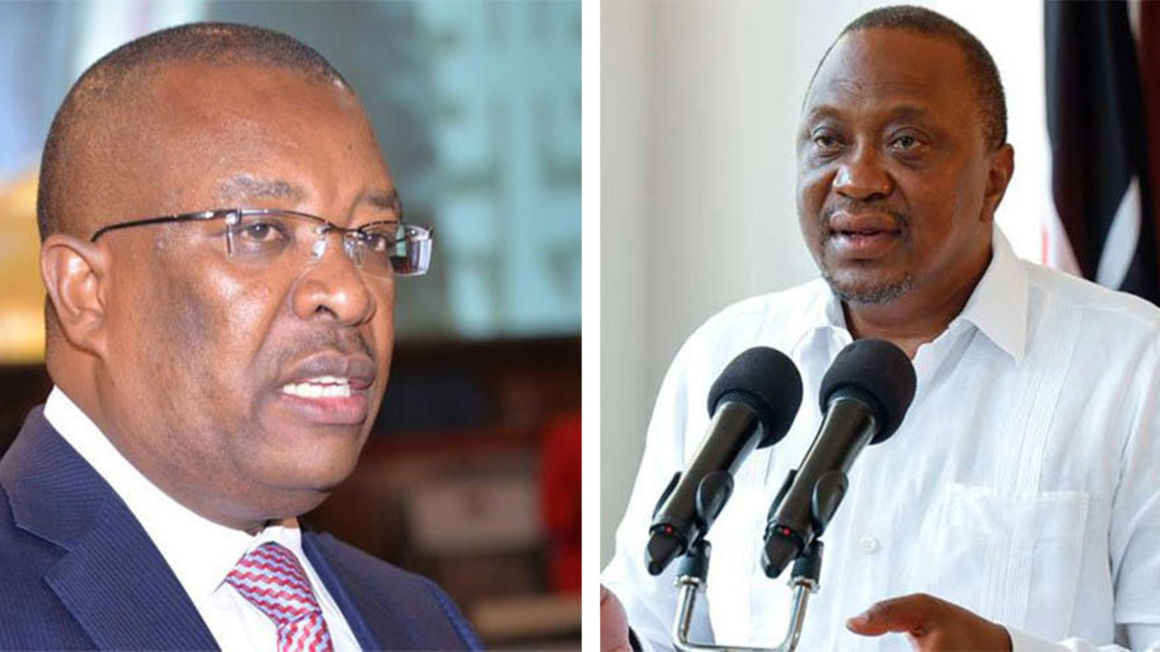
Co-operative Bank chief executive Gideon Muriuki (left) and President Uhuru Kenyatta. FILE PHOTOS | NMG
Summary
- The Kenyattas are set to receive Sh326 million for their combined 13.2 percent stake in NCBA Group, which has proposed a payout of Sh1.5 per share.
- The Ndegwas will earn Sh290 million on their 11.7 percent ownership in the same bank, which was created following the merger of the former NIC Group and CBA Group.
- Mr Muriuki is set for a Sh102 million payout after Co-op Bank declared a dividend of Sh1 per share
The families of Jomo Kenyatta and former Central Bank of Kenya Governor Philip Ndegwa and individual investors Baloobhai Patel and Gideon Muriuki, the Co-operative Bank
chief executive, are among the top beneficiaries of the combined Sh17.1 billion dividends that Kenya’s listed banks are set to pay.
The Kenyattas are set to receive Sh326 million for their combined 13.2 percent stake in NCBA Group
, which has proposed a payout of Sh1.5 per share.
The Ndegwas will earn Sh290 million on their 11.7 percent ownership in the same bank, which was created following the merger of the former NIC Group and CBA Group.
Mr Muriuki is set for a Sh102 million payout after Co-op Bank declared a dividend of Sh1 per share. Mr Patel will get Sh34 million for his 0.58 percent ownership in the same bank.
At Sh752 million, the combined dividends of the two families, Mr Muriuki and Mr Patel mark the second year in which the high-profile individual bank owners have raked in less than Sh1 billion.
The drop was occasioned by the absence of Equity Group’s
chief executive, James Mwangi, from the list. Mr Mwangi used to earn Sh377 million – the largest dividend earned by an individual from a single stock – on his five percent stake in the bank in previous years.
Equity has, however, not paid a dividend for 2019 and 2020, citing the need to build capital resilience in the wake of the Covid-19 pandemic.
Bank owners have generally fared worse over the past two years when the institutions have slashed cash distributions by large margins in the wake of Covid-19, which has triggered a rise in costs associated with loan defaults.
The eight Nairobi Securities Exchange-listed banks that have published their results for the year ended December have proposed to pay a total dividend of Sh17.1 billion.
This represented a 45.8 percent drop compared to the Sh31.7 billion they paid for the previous year when the dividend cuts started after the country recorded its first coronavirus case in mid-March 2020.
In the past two financial years, banks have slashed their cash distribution by a cumulative Sh32.2 billion compared to a pre-pandemic peak of 2018 when they paid Sh40.5 billion.
Equity made the deepest cut, skipping payouts in both 2019 and 2020 in what has saved it a total of Sh15 billion.
The bank last paid a dividend of Sh2 per share or a total of Sh7.5 billion for the year ended December 2018.
Its increased conservatism arises from the economic fallout from the pandemic besides the acquisitions it has been pursuing.
The bank spent $95 million (Sh10.4 billion) last year to buy a 66.5 percent stake in DRC’s Banque Commerciale Du Congo.
The company walked away from a proposed share swap deal to acquire from Atlas Mara four regional banks that would have also required additional capital injection.
Equity reported the smallest profit drop among the big banks at 11.6 percent to Sh19.7 billion in the year ended December, helped by a large deferred tax of Sh8.2 billion.
Deferred taxes are obligations arising in the review period but which will be paid in the future.
KCB
is second after reducing its dividend payout by Sh7.8 billion. The bank has proposed a payout of Sh3.2 billion or Sh1 per share, down from Sh11 billion or Sh3.5 per share the year before.
Like Equity, KCB slashed its dividends partly to build a war chest to fund its impending acquisitions.
KCB is set to spend Sh4.4 billion to buy two banks in Tanzania and Rwanda from Atlas Mara, with the transactions expected to be concluded by June.
It is also providing an additional capital of Sh3 billion to National Bank of Kenya (NBK), with the cash going to helping the subsidiary comply with minimum capital requirements.
KCB’s net profit declined 22 percent to Sh19.6 billion on the back of increased provisions for coronavirus-related defaults.
The loan loss provisions tripled to Sh27.5 billion from Sh8.8 billion, with the bank responding to non-performing loans rising to Sh96.6 billion from Sh63.4 billion.
Absa Bank Kenya suspended dividends in what has seen its shareholders forego their usual earnings of Sh5.9 billion or Sh1.1 per share.
The move came after the bank posted one of the largest profit drops of 44.1 percent to Sh4.1 billion, weighed down by increased provisions for bad debt and one-off costs of separating from its former parent firm Barclays Plc.
Customers had defaulted on Sh432 billion worth of loans across the banking industry as of February, with lenders raising their provisions for the non-performing loans (NPLs).
“The ratio of NPLs to gross loans stood at 14.5 percent in February compared to 14.1 percent in December. NPL increases were noted in the real estate, agriculture, personal and household, and manufacturing sectors,” the Central Bank of Kenya said in a statement.
“The increases in NPLs were attributable to the subdued business environment, and banks continue to make provisions for the NPLs.”
Despite the challenges, a few banks maintained or resumed dividend payouts, signalling their robust capital buffers.
Co-op Bank, for instance, maintained its payout of Sh1 per share or an aggregate of Sh5.8 billion even as its net earnings fell 24.4 percent to Sh10.8 billion.
NCBA also resumed dividend payment at a rate of Sh1.5 per share for a total of Sh2.4 billion despite its net profit declining 41.7 percent to Sh4.5 billion.
The lender last year declared a similar payout of Sh1.5 per share and later cancelled it, replacing it with a bonus share of one for every 10 held.
The bank at the time said it had changed its mind after taking stock of the potential impact of the pandemic on its business.





No comments :
Post a Comment